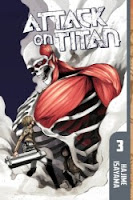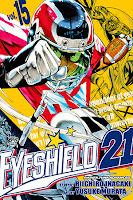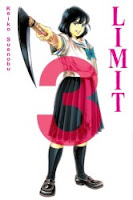My News and Reviews
Well, I didn’t end up posting any in-depth manga reviews last week, but I did review a couple of novels. The first review was for Tokyo Demons, Book 1: You’re Never Alone by Lianne Sentar. I’m actually so excited about the series that I’ll be writing more about the project later this week; I couldn’t fit it all into one review. I also reviewed Toh EnJoe’s Self-Reference Engine, which may or may not actually be a novel. Whatever it is, I loved it. The book is smart, funny, and clever science fiction.
The 2013 Eisner Award nominees were announced last week. There are some really great comics and creators up for an award this year. Manga nominees include Osamu Tezuka’s Barbara, Naoki Urasawa’s 20th Century Boys, Shigeru Mizuki’s NonNonBa (which I previously reviewed), and Mari Yamazaki’s Thermae Romae. Katsuya Terada also received a nomination for his work on The Monkey King.
Other interesting things seen online: It appears as though there may be a new manga publisher on the horizon—Kansai Club Publishing. Lissa Pattillo of Kuriousity shared some thoughts on the effort, which is where I first learned of it. Supposedly, Kansai Club will be launching a Kickstarter soon for its first release. Elsewhere, the most recent episode of The Cockpit podcast is devoted to Vertical’s release of Mobile Suit Gundam: The Origin. Ed Chavez, the marketing director at Vertical, discusses the series’ licensing, production, and promotion efforts among other things. (I’ll be posting my own review of the first volume in the near future.)
Jason Thompson’s always excellent House of 1000 Manga column featured Takako Shimura’s Wandering Son last week. (It’s a series that is personally very important to me.) And as usual, the article is great. Back in March, Tofugu had an entertaining post about common visual tropes used in manga. A followup article was posted last week—Manga Tropes Revisited. Finally, this week is the Kaori Yuki Manga Moveable Feast! The Beautiful World is hosting this month’s Feast and has posted an introduction. Later this week I’ll be reviewing the first volume of Yuki’s Grand Guignol Orchestra as my contribution to the Feast.
Quick Takes
 Attack on Titan, Volumes 3-4 by Hajime Isayama. For the most part I am enjoying Attack on Titan. However, its unevenness in art and storytelling can be a bit jarring. At times the manga is genuinely thrilling while at other times it seems to be just a little off. Granted, the effect is disconcerting and does add to the dark, oppressive atmosphere of the manga. A significant portion of the fourth volume is a flashback devoted to the military training of the young soldiers. It was interesting to see this and it was a great way to get to know some of the trainees better, but it may have been more effective earlier on in the series since so many of those characters are already known to end up dead.
Attack on Titan, Volumes 3-4 by Hajime Isayama. For the most part I am enjoying Attack on Titan. However, its unevenness in art and storytelling can be a bit jarring. At times the manga is genuinely thrilling while at other times it seems to be just a little off. Granted, the effect is disconcerting and does add to the dark, oppressive atmosphere of the manga. A significant portion of the fourth volume is a flashback devoted to the military training of the young soldiers. It was interesting to see this and it was a great way to get to know some of the trainees better, but it may have been more effective earlier on in the series since so many of those characters are already known to end up dead.
 Black Jack, Volumes 4-6 by Osamu Tezuka. I really do adore Black Jack as a character. He can be an utter bastard, but he’s also incredibly compassionate underneath his harsh exterior. An unparalleled surgeon, he wields his skill as he chooses. Well, except when he’s blackmailed into it. But then again, he’s just as likely resort to extortion. Perhaps because of Tezuka’s medical background, a lot of attention is given to the actual operations that Black Jack performs. Although there are recurring characters in Black Jack, generally the individual stories stand alone. As with any work, some stories are stronger than others. Personally, I prefer the more plausible scenarios, although the more fantastical ones can still be enjoyable.
Black Jack, Volumes 4-6 by Osamu Tezuka. I really do adore Black Jack as a character. He can be an utter bastard, but he’s also incredibly compassionate underneath his harsh exterior. An unparalleled surgeon, he wields his skill as he chooses. Well, except when he’s blackmailed into it. But then again, he’s just as likely resort to extortion. Perhaps because of Tezuka’s medical background, a lot of attention is given to the actual operations that Black Jack performs. Although there are recurring characters in Black Jack, generally the individual stories stand alone. As with any work, some stories are stronger than others. Personally, I prefer the more plausible scenarios, although the more fantastical ones can still be enjoyable.
 Eyeshield 21, Volumes 15-19 written by Riichiro Inagaki and illustrated by Yusuke Murata. In these volumes, the Deimon Devil Bats continue to advance in the fall Tokyo tournament, hoping to reach and play in the Christmas Bowl at the end of the year. I’ll admit, the artwork in Eyeshield 21 is still what appeals to me most about the series. I love Murata’s dynamic action sequences and the ridiculous imagery that often accompanies them: tidal waves, knights in armor, steam engines, etc. Each team has a visual theme that coincides with their team name, mascot, or style of play. So the Bando Spiders have spiders and webs, the Kyoshin Poseidon have water motifs, and so on. It’s really a lot of fun.
Eyeshield 21, Volumes 15-19 written by Riichiro Inagaki and illustrated by Yusuke Murata. In these volumes, the Deimon Devil Bats continue to advance in the fall Tokyo tournament, hoping to reach and play in the Christmas Bowl at the end of the year. I’ll admit, the artwork in Eyeshield 21 is still what appeals to me most about the series. I love Murata’s dynamic action sequences and the ridiculous imagery that often accompanies them: tidal waves, knights in armor, steam engines, etc. Each team has a visual theme that coincides with their team name, mascot, or style of play. So the Bando Spiders have spiders and webs, the Kyoshin Poseidon have water motifs, and so on. It’s really a lot of fun.
 Laugh Under the Sun by Yugi Yamada. I picked up Laugh Under the Sun primarily because I tend to enjoy Yamada’s boys’ love manga. Also, it has boxing! After seriously injuring an opponent, Sohei has been reluctant to return to the ring. For the last ten years he’s managed to get by on his good looks, but he’s tired of having no direction in his life. His more successful friend Chika (who is in love with Sohei although Sohei is oblivious to it), encourages him to take up boxing again. He does, but it’s not easy—the younger boxers at the gym don’t respect Sohei much and his confidence is lacking. Laugh Under the Sun isn’t particularly deep or complicated but it is an enjoyable one-shot with a bit of romance and humor to go along with the fighting sports.
Laugh Under the Sun by Yugi Yamada. I picked up Laugh Under the Sun primarily because I tend to enjoy Yamada’s boys’ love manga. Also, it has boxing! After seriously injuring an opponent, Sohei has been reluctant to return to the ring. For the last ten years he’s managed to get by on his good looks, but he’s tired of having no direction in his life. His more successful friend Chika (who is in love with Sohei although Sohei is oblivious to it), encourages him to take up boxing again. He does, but it’s not easy—the younger boxers at the gym don’t respect Sohei much and his confidence is lacking. Laugh Under the Sun isn’t particularly deep or complicated but it is an enjoyable one-shot with a bit of romance and humor to go along with the fighting sports.
 Limit, Volumes 3-4 by Keiko Suenobu. After their bus crashes on a school trip, five high school girls struggle to survive the accident and each other while waiting to be rescued. When another survivor happens upon the group, the power dynamics shift dramatically, setting off an extreme backlash from some of the members. Honestly, I didn’t like these volumes quite as much as I did the first two; some of the characters’ actions weren’t as nearly as convincing. At the same time, they are all under a tremendous amount of stress and so maybe it shouldn’t be too surprising that some of their behaviors are less than rational. Still, Limit is intense and I’m very interested in seeing how Suenobu wraps everything up in the final two volumes.
Limit, Volumes 3-4 by Keiko Suenobu. After their bus crashes on a school trip, five high school girls struggle to survive the accident and each other while waiting to be rescued. When another survivor happens upon the group, the power dynamics shift dramatically, setting off an extreme backlash from some of the members. Honestly, I didn’t like these volumes quite as much as I did the first two; some of the characters’ actions weren’t as nearly as convincing. At the same time, they are all under a tremendous amount of stress and so maybe it shouldn’t be too surprising that some of their behaviors are less than rational. Still, Limit is intense and I’m very interested in seeing how Suenobu wraps everything up in the final two volumes.

If my book budget wasn’t so tied up with great manga releases this year, I might consider reading Self Reference Engine. It seems really interesting.
Just two days ago, I would have said that Thermae Romae should win the Eisner, but after reading NonNonBa, I’d be happy if either won.
Sometimes I feel like I’m the only one that doesn’t care about Attack on Titan. Especially now with all the anime hype. I read the first volume and wasn’t particularly impressed, but maybe I should finally get to reading the volumes 2 & 3 that are just sitting on my shelf and see what the big deal is.
Self-Reference Engine was a really strange and absurd book, one of my favorites so far this year.
Like you, I enjoyed NonNonBa more than I did Onward Towards Our Noble Deaths. As for my personal Eisner pick, I’m leaning towards Thermae Romae, followed by NonNonBa. I was surprised to see 20th Century Boys nominated again, since it won in 2011. And while I appreciate Barbara, I think there was better Tezuka released last year. (Namely, Message to Adolf.)
I’m torn over Attack on Titan. There are parts that I really like such as the dark, creepy atmosphere and the three-dimensional maneuvers fighting system. But I haven’t caught the fervor that so many other people seem to have. I want to like the series more than I actually do at this point.